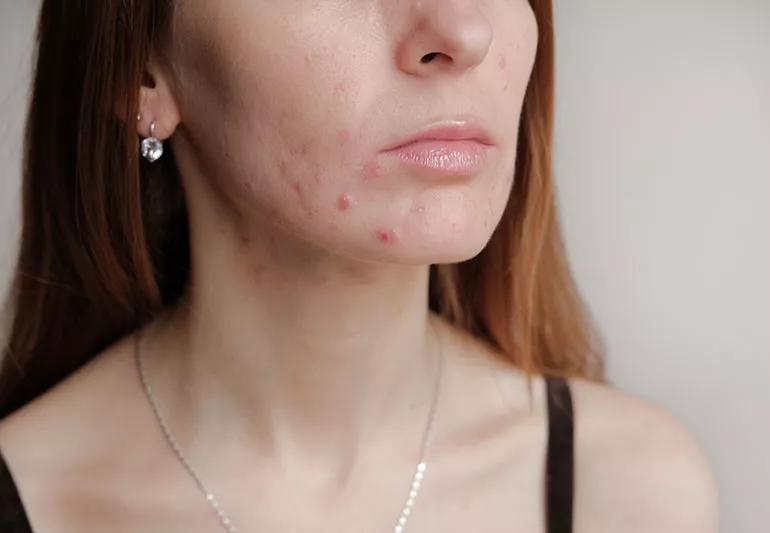An expert weighs in

Image content: This image is available to view online.
View image online (https://assets.clevelandclinic.org/transform/7170bbef-c4fd-4967-96a7-bbd573da8ab8/AcneThyroid-1167910623-770x533-1_jpg)
Closeup of jawline with inflamed, red acne
A quick look in the mirror reveals another acne breakout. You’re over 25, so what gives? There are a number of things that might be the culprit, but you wonder: Could a thyroid problem be to blame?
Advertisement
Cleveland Clinic is a non-profit academic medical center. Advertising on our site helps support our mission. We do not endorse non-Cleveland Clinic products or services. Policy
“Acne vulgaris is the medical term for chronic inflammation of the hair follicles in your skin. Dead skin cells, oil and bacteria block the follicles,” says endocrinologist Alexandra Mikhael, MD. “While there are many reasons acne develops, the leading cause of post-adolescent acne is hormone imbalance.”
Because the thyroid is your body’s hormone team captain, many have made the connection between the thyroid and acne. Dr. Mikhael examines whether it’s fact or fiction.
Video content: This video is available to watch online.
View video online (https://cdnapisec.kaltura.com/p/2207941/sp/220794100/playManifest/entryId/1_j64si7k4/flavorId/1_5f3sgelj/format/url/protocol/https/a.mp4)
Located at the base of your neck, the thyroid is a small butterfly-shaped gland with a big role. It’s responsible for secreting the hormones that control your metabolism, which is how your body uses energy. And it also regulates skin function, such as how much oxygen the skin absorbs.
“The skin is one of the first organs where thyroid hormone imbalances start to show. That’s why dermatologists often suspect thyroid disorders when people have certain skin conditions, such as alopecia and vitiligo,” notes Dr. Mikhael. Alopecia is when your hair falls off in patches. Vitiligo is when you lose pigment cells, so your skin can look discolored in places.
“But acne vulgaris isn’t usually one of the skin conditions related to thyroid disorder,” she adds. “Thyroid hormones can affect the hair follicles, but there isn’t any evidence that thyroid hormone levels cause acne.”
Advertisement
Hypothyroidism, which is an underactive thyroid, can lead to dry skin, for example. “If you have dry skin, debris might accumulate,” Dr.Mikhael says. “It could clog pores and lead to acne. However, acne is not a typical symptom of hypothyroidism.”
Dr. Mikhael says that thyroid medications don’t typically cause acne either unless you’re allergic to an ingredient they contain. But some acne medications can affect thyroid tests. For example:
So now that your thyroid is off the hook for causing your acne breakouts, what IS the cause?
It could be several things — changing hormone levels, makeup products you use, a medication side effect, stress or simply too much oil. “Cleaning your face twice a day, putting on proper moisturizing lotions and avoiding pore-clogging makeup should help prevent it,” suggests Dr. Mikhael.
Talk to your healthcare provider or a dermatologist about the best way to treat these unwanted facial guests.
Advertisement

Sign up for our Health Essentials emails for expert guidance on nutrition, fitness, sleep, skin care and more.
Learn more about our editorial process.
Advertisement
Hypothyroidism is underactivity of your thyroid gland, while hyperthyroidism is overactivity — but both conditions need treatment
No diet can cure hypothyroidism or hyperthyroidism, but some foods and supplements can cause trouble
Foods high in selenium, like Brazil nuts, cottage cheese and some fish, can help support healthy thyroid function
Only take supplements recommended by your healthcare provider — others can worsen your condition
Typical signs include growth delays and low energy
Hyperthyroidism can make you feel sluggish and exhausted — but so can other conditions
The truth about natural thyroid symptom relief
How overtreatment for hypothyroidism places you at risk
Although it could be used as a moisturizer, this new trend is not recommended
Communicating clear limits helps protect your time, energy and emotional well-being
High cholesterol can be genetic, but testing and treatment can lower your heart disease risk